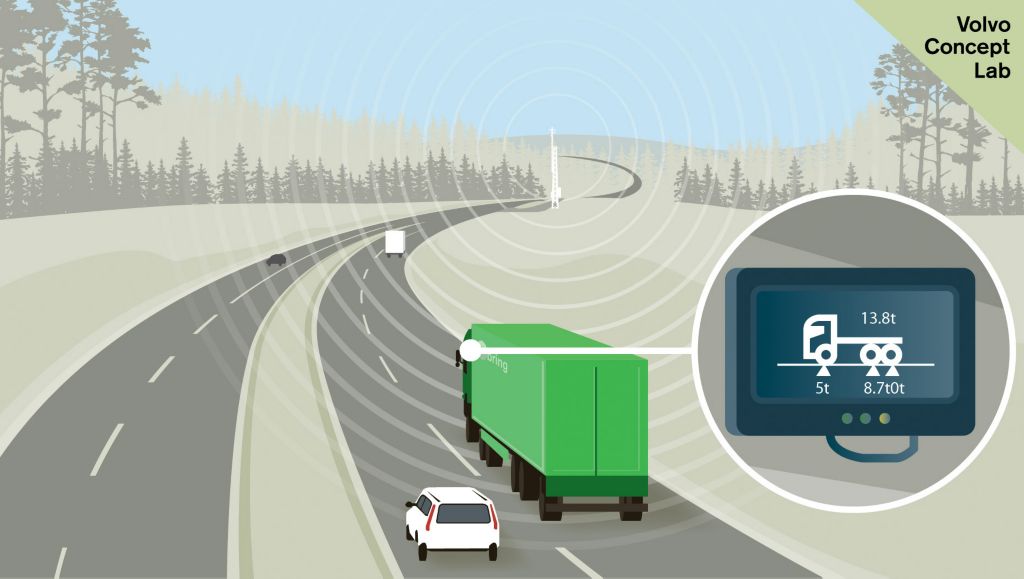New technology helps the truck to weigh itself


The countries in Europe impose regulations on the trucks that travel on their roads. Some of these relate to the weight of the truck. To ensure that vehicles comply with the regulations, weighbridges have been set up on major roads where trucks are stopped and are weighed at regular intervals. The inspections are carried out manually, which makes them time-consuming, and the trucks often have to queue to take their turn on the weighbridge.
This wastes time and leads to deliveries arriving late. In order to simplify these checks, the Norwegian Public Roads Administration and the Volvo Group are taking part in an EU-funded project called Non-Stop Trucks. Volvo is the only truck manufacturer involved.
Xu Wen, who works in the field of connected vehicles within the Volvo Group, is the project manager.
“We have installed transmitters in the trucks. As a truck approaches a weighbridge, it sends data on the weight of the truck to the weighbridge via a wireless network. At the same time, information for the driver is displayed on a screen in the cab. The data is checked automatically at the weighbridge and if it complies with the regulations, the driver is given a green light and does not need to stop and have the truck inspected,” explains Xu Wen.
Our main objective is to improve safety on our roads.
Because the information is sent and processed when the truck is still 800 metres away from the weighbridge, the driver does not even need to turn off the road and can continue as normal.
During a period of just over two months, the system was tested at one of the weighbridges on the road between the Norwegian cities of Oslo and Fredrikstad, which are about 90 kilometres apart.
The transmitters were installed in a number of trucks, including two of the Volvos belonging to the haulage company Bring. Pål Proitz-Roland, from Bring in Fredrikstad, is very happy with the results.
“It saved us time and reduced our stress levels. We transport containers on a fixed route between Oslo and Fredrikstad and we have to arrive in time to load them onto trains. For us, the logistics system is crucial. It’s like a house of cards. If we are delayed somewhere, the whole thing could come crashing down. That’s why this type of system is very valuable for us. It’s great that the Volvo Group is working in areas like this,” he says and explains that it is also important for road safety.
“Like most other haulage companies, we put a lot of effort into complying with the laws and regulations in the countries where we operate, so we would be happy to install a system like this in our trucks. It will help us to do business more efficiently and also leave more resources available for stopping and checking the trucks that are breaking the law,” he says.
Örjan Tveit from the Norwegian Public Roads Administration agrees.
“Our main objective is to improve safety on our roads. Making checks more efficient brings lots of benefits,” he says and points out that the Non-Stop Trucks project is just the first step.
“This project was about the weight of the trucks, but we think that having access to other relevant data, such as information about hazardous goods, the status of the brakes and tyres and how often the driver is taking a break, can offer us major advantages. The data of this kind that we can collect about the vehicles on our roads will be very valuable to us,” he says.
The system has been tested at the Skandia Harbour in Gothenburg in Sweden, as well as in Norway. The Non-Stop Truck project has now come to an end, but, according to Xu Wen, work in this area will continue at the Volvo Group.
“This is a good example of how the technology involved in connected vehicles can help our customers and make their lives easier. We will use the information we have gathered during this project to develop similar systems in future,” he says.
MOBiNet is an EU-funded programme covering transport, mobility and wireless communications. Non-Stop Trucks is one of the eight different projects that make up MOBiNet.